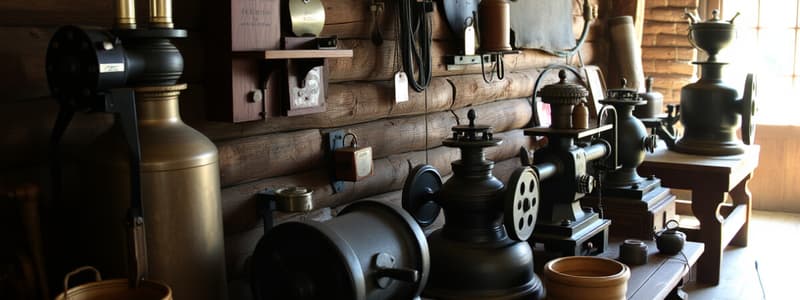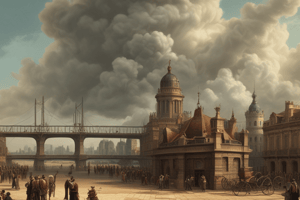Podcast
Questions and Answers
What is the putting-out system?
What is the putting-out system?
- A type of transportation system
- A form of factory production
- A system where merchants loan raw materials to workers (correct)
- A government-imposed trade regulation
Who invented the spinning jenny?
Who invented the spinning jenny?
James Hargreaves
What was the purpose of the water frame?
What was the purpose of the water frame?
To spin yarn with greater power and capacity
What did James Watt invent?
What did James Watt invent?
What did the puddling furnace allow manufacturers to do?
What did the puddling furnace allow manufacturers to do?
What was the significance of George Stephenson's locomotive?
What was the significance of George Stephenson's locomotive?
What was the Great Exhibition?
What was the Great Exhibition?
What concept did Thomas Malthus argue regarding population growth?
What concept did Thomas Malthus argue regarding population growth?
What is the iron law of wages?
What is the iron law of wages?
Who advocated for government support of industrialization?
Who advocated for government support of industrialization?
What is the purpose of a protective tariff?
What is the purpose of a protective tariff?
What do limited liability laws provide for investors?
What do limited liability laws provide for investors?
What did the Factory Acts do?
What did the Factory Acts do?
What was the impact of the Mines Act of 1842?
What was the impact of the Mines Act of 1842?
Who were the Luddites?
Who were the Luddites?
What did the Combination Acts of 1799 do?
What did the Combination Acts of 1799 do?
Who was Robert Owen?
Who was Robert Owen?
What was the Grand National Consolidated Trades Union?
What was the Grand National Consolidated Trades Union?
What was the primary demand of the Chartists?
What was the primary demand of the Chartists?
What characterized the Second Industrial Revolution?
What characterized the Second Industrial Revolution?
What is capitalism?
What is capitalism?
What does laissez-faire refer to?
What does laissez-faire refer to?
What is the 'invisible hand' concept?
What is the 'invisible hand' concept?
What was socialism's key idea regarding property?
What was socialism's key idea regarding property?
Who were the Utopian socialists?
Who were the Utopian socialists?
What is communism according to Karl Marx?
What is communism according to Karl Marx?
What did the Communist Manifesto advocate?
What did the Communist Manifesto advocate?
Flashcards are hidden until you start studying
Study Notes
Industrial Revolution Concepts
-
Putting out system / Cottage industry
- Merchants loan raw materials to workers who process them at home.
- Hand tools are primarily used in this decentralized manufacturing system.
-
James Hargreaves / Spinning Jenny
- Invented to enhance textile production efficiency.
- Allowed simultaneous spinning of multiple threads (6-24 spindles).
- Primarily operated by women, combining manual labor for power and movement.
-
Richard Arkwright / Water Frame
- Introduced a large-scale spinning machine requiring water power.
- Utilized specialized mills alongside water streams for energy.
- Improved strength of thread while maintaining cottage industry relevance.
-
James Watt / Steam Engine
- Revolutionized mechanical pumps, replacing horse-powered methods.
- His enhancements included a condenser for higher efficiency.
- Broadened industrial capabilities by utilizing coal for steam generation.
-
Puddling Furnace
- Advanced pig iron refining process to produce high-quality iron or steel.
-
George Stephenson / Locomotive (Rocket)
- First successful steam locomotive; changed transport dynamics.
- Enabled reduced costs and greater reliability in freight shipping, expanding market reach.
-
Crystal Palace
- Venue for London's Great Exhibition, showcasing industrial advancements.
- Constructed entirely of glass and iron, symbolizing new industrial capabilities.
- Celebrated Britain's emerging status as a global economic leader.
Economic Theories and Social Movements
-
Thomas Malthus / Essay on the Principle of Population
- Warned about potential disasters from population growth exceeding food supply.
- Advocated for "prudential restraint" to control population growth.
-
David Ricardo / Iron Law of Wages
- Proposed that wages tend to always fall to subsistence levels due to population pressures.
-
Friedrich List / National System of Political Economy
- Advocated for government support in industrialization.
- Emphasized economic growth to prevent Germany from lagging behind.
-
Economic Nationalism
- Focused on self-sufficiency through protective tariffs on imported goods.
-
Protective Tariff
- Strategy to shield domestic industries by imposing high import taxes.
-
Limited Liability
- Allowed investors to risk only their original investment, promoting banking and industrial investment.
-
Factory Acts (1802-1833)
- Series of regulations aimed at improving working conditions, especially for child laborers.
- Established limits on working hours and safety requirements.
Labor Movements and Class Awareness
-
Separate Spheres
- Defined gender roles during the Industrial Revolution, with men as primary earners and women as homemakers.
-
Mines Act of 1842
- Banned underground work for women, girls, and boys under ten.
-
Class Consciousness
- Recognition of shared social and economic interests among distinct classes.
-
Luddites
- Craftsmen who opposed industrialization by destroying machines that threatened their jobs.
-
Combination Acts of 1799
- Legislation that prohibited unions and strikes; ignored by many workers.
- Led to the formation of early unions, repealed in 1824, becoming tolerated but not fully legal until 1867.
-
Robert Owen
- Advocate for labor unions and better working conditions; sought to create national unions.
- Promoted cooperative communities focusing on workers' health and rights.
Socialism and Economic Structures
-
Grand National Consolidated Trades Union
- Notable early national union promoting worker rights and interests.
-
Amalgamated Society of Engineers
- Successful craft union known for winning benefits for its members.
-
Chartists
- Movement advocating for political democracy and labor rights, including limiting work hours.
-
Second Industrial Revolution (ca. 1860-1914)
- Characterized by advancements in steel, electricity, and transportation in the U.S.
-
Capitalism / Free Market
- Economic system emphasizing private property, competition, and minimal government interference.
-
Socialism
- Critique of capitalism focusing on economic equality and community ownership of property.
Utopian and Radical Socialist Ideas
-
Utopian Socialists (Saint-Simon, Fourier, Blanc, Proudhon)
- Proposed alternative social frameworks promoting cooperation and community values.
- Saint-Simon emphasized the role of industrialists in planning economies.
- Fourier envisioned socially structured communities (phalanxes) with shared resources.
-
Communism / Marxist Socialism
- Originated from Karl Marx, emphasizing class struggle as a driver for social change.
- Predicted an eventual overthrow of capitalism leading to a classless society.
-
Karl Marx
- Prominent theorist of socialism, advocating for the proletariat's revolution against bourgeois oppression.
- Worked towards establishing the foundations of communist ideology.
-
Marx and Engels / The Communist Manifesto (1848)
- Declared the emergence of communism and outlined its core principles, including class struggle and collective ownership.
Studying That Suits You
Use AI to generate personalized quizzes and flashcards to suit your learning preferences.





